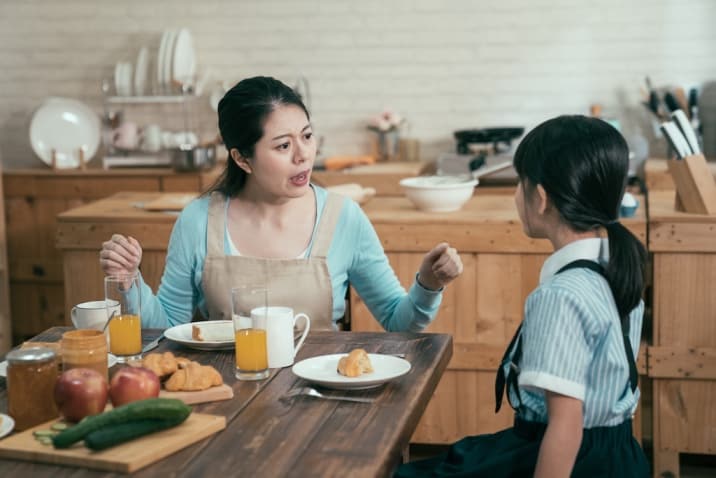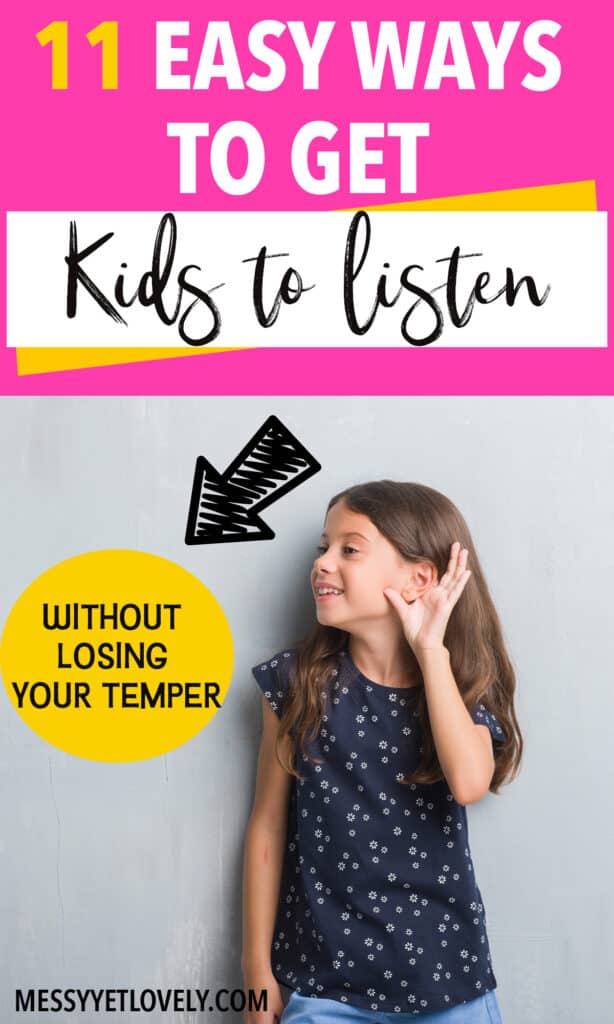We want our children to listen to us the first time we ask them to do something. But they seem to have their own mind and hundreds of reasons to do it their way.
Of course, they are humans too but parents need children’s co-operation to become a smooth functioning family.
Here are some ways to get cooperation from kids easily.
1. ASK RESPECTFULLY
No one likes to take orders. Be it, small kids, or adults. Giving orders like “Do it!” creates resistance.
Just like us, kids like their independence and don’t take it well when someone tells them what they should do all the time.
Authoritarian way of parenting can only help make kids more defiant and uncooperative. Young kids may comply with your requests when you threaten or give physical punishment, but you lose the chance of developing a good relationship with them.
This causes them to become a rebel and initiate backtalks and power struggles. However, there are certain techniques using which you can make kids retain their own sense of freedom and at the same time cooperate with your requests too. One thing you can do is to stop commanding.
According to Amy McReady, a leading positive parenting expert, inviting cooperation is much better than demanding.
How to invite cooperation?
By changing your words and by changing your tone!
Instead of,
Sara, chop the vegetables if you want me to make pasta for you!
You can try,
I would appreciate it if you chop the vegetables so that we can get the dinner ready on the table quicker!
The words “appreciate” and “we” indicate that their co-operation is appreciated and they are part of the teamwork. By using these words, they feel included and connected.

2. GIVE CHOICES AND SHOW EMPATHY
It is hard to get cooperation from kids if they are in the middle of an exciting activity and you want them to do their homework.
If you try to scold or forcefully drag them out of what they are doing, you can expect tantrums or power struggles.
Instead of doing that and instead of saying, “Enough with playing, go do your homework”, which no child likes to oblige to, go near them.
And observe what they are doing.
And say,
“You seem to be having a good time playing with the Barbie set.”
Most probably, the child will respond enthusiastically. You can express genuine interest in her play and listen to what she says and then come to the point.
“Remember, this is a school night. We don’t want to sleep late, so better do your homework before it’s late”.
And then offer choices if required.
“Do you want to do your homework now or after five more minutes of playing?”
Remember when you offer choices, either option they choose should be okay for you. And kids are more ready to cooperate with you when they are part of the solution.
Here, you are also taking a moment to connect with the child’s world. The importance of connection can never be overstressed in positive parenting. When there is connection, there is less misbehavior and more co-operation.
Related: 10 ways to connect with your child when you are a busy mom
3. YELLING DOESN’T MAKE KIDS CO-OPERATE WITH YOU
It is when you don’t have the kids’ attention that you start yelling.
I don’t think anyone feels good after yelling: neither the one who yells nor the one who is yelled at. And by yelling frequently, you are training your child to not listen to you until your yelling voice comes out.
Ever wondered why a child listens to you the tenth time when you yell and ignores your polite request the nine times before that?
Because they have trained you or you have trained them to ignore you until you yell. And remember that it’s when you talk across from a room or from a far distance that you have to yell.
When you want kids to listen to your request, go closer to them physically, and take a moment to connect or have eye contact.
When you have their attention, they can’t ignore you.
And now you can ask them what you want gently. Try this, because this technique has more chances of your child listening to you than when you yell.
When we yell, they are terrified and scared and they hear your voice more than your words.
And over time, they learn to tune you out even though you are yelling. And the worse part they learn the behavior and start yelling back and even continue the cycle with the next generation.
Related: How to stop yelling at your kids when angry

4. DESCRIBE WHAT YOU SEE
I love this method because it doesn’t involve accusing the kids. I learned this approach from Amy McReady.
For example, if you see your child watching TV while the toys are scattered all over the floor, what would be your first reaction?
Do you say, “Why can’t you ever clean up the toys after playing?”
The problem with this question is, it’s an attack on the person itself and may not bring the desired results, that is, their cooperation in picking the toys up.
Instead, you can say,
“Oh, I see toys all over the floor. What’s your plan for picking them up?”
This approach works because it doesn’t attack their character or label them as someone “who never cleans up”.
Instead, this helps them to take action and be aware of the part that they should be doing. Also, when you ask about their plan, they have to come up with an answer and realize that they have to clean now.
Related: How to get kids started on doing chores
5. REFRAIN FROM LECTURING
You can explain what you see in one word. When you go on and on about what they do or don’t do, your words would become less effective.
As parents, our aim should be to use fewer words and make those fewer words effective. Who wants to drone on and on and then be completely ignored mercilessly?
So, get to the point as soon as possible and use shorter sentences.
The bathroom light is ON.
The towel is on the floor.
These statements often have more power than a long-drawn lecture. And it is easier for the kids too, to not have to listen to the nagging.

6. MAKE YOUR WORDS COUNT
Parents often make the mistake of repeating themself and give warnings so many times that kids lose trust in us to follow through.
Imagine the following scenario.
Two kids are fighting over a toy and mom says that she will take the toy away until they can find a solution without fighting. But mom doesn’t take action.
She keeps saying, “I will take the toy away if you two keep fighting” or “I will do it and never give back”, etc. and finally does it only after repeating herself so many times.
Here the kids will take her seriously only if she follows through after giving the warning once. Don’t be a broken record because when you keep repeating yourself only to finally lose it, you teach your kids that they are in trouble only when you yell.
So make sure your words count.
And also refrain from giving empty threats like “I will not take you to the park today if you don’t eat your food” if you have no intention of acting upon your words. It’s very important.
Setting limits and enforcing consequences is essential. But always make sure you follow through. Kids must get the idea that they get only one warning.
I cannot stress this enough.
MAKE. YOUR. WORDS. COUNT
7. MAKE IT FUN
Sometimes when the kids don’t want to co-operate with your requests, the easiest way to invite co-operation is to make an instant game.
“Oh, you don’t want to clean your room? I get it. Sometimes I don’t feel like cleaning too. But let’s make it interesting by playing this song and see if you can make the room tidy before it ends!”
Sometimes, when the kids are tired and simply don’t want to do a task, I try to lighten up the mood by telling a joke or do a cuddle-and-tickle. Children can be easily distracted and they laugh easily too.
Once you take a moment to connect, it is easier to get co-operation from kids. And it is so much better than anger or yelling.
8. EXPLAIN THE REASON
“Because I said so”, doesn’t always work and it is not a good strategy either. Sometimes, when you explain the reason behind your request, they can understand why and be more willing to do it.
For example, when you ask kids to not ask for your phone or for more screen time, they might not understand why. Because they see everyone using phones around them.
But when you explain to them how too much screen time is bad for children’s brain development and eyesight, they would be more willing to comply.

9. LET THEM LEAD
Human beings generally don’t like taking orders and also don’t feel good about always having to obey other people. Toddlers, especially like to push for independence and test the boundaries in various ways.
It is a natural part of their development. To reduce power struggles and invite co-operation, lead them to the actions that you want them to take.
For example, during the night routine, ask them,
“Ok. Now that you are feeling sleepy, what is the first thing you do to get ready for bed?”
They will answer you and you can ask more questions that invite co-operation.
This also helps in making them think for themselves and follow the routine even if you are not around. Also, instead of asking them to do something, you are hearing it from them. This makes them feel better about doing the task because they are not commanded again.
Related: How to teach your child to be independent
10. STOP REPEATING YOURSELF
Like yelling, nagging is another behavior that kids can get used to. If you have the nagging habit, make sure you nip it in the bud because it is exhausting for you and will never teach kids to listen.
One way to get a faster response is as I said, go near them and speak face-to-face so they can’t ignore your request.
Another thing you can do is to make sure they understood you by asking them to repeat what you said.
Younger kids are usually very distracted and if they are watching TV or playing with siblings, their attention is usually not on what you say.
So when you ask them to repeat back what you said, they hear it and they know they have to do it because they couldn’t tune you out.
11. LEAVE A NOTE
Even if you are at home or not, leaving a short note is a great way to make kids listen without speaking.
Thanks for hanging your towel back up!
Thanks for doing the dishes!
For kids, leaving such notes ensure your trust in them to do their active part in running the household. Because after all, everyone wants to be included and counted as an important member of the family.
FINAL NOTES
Children are human beings and have all the feelings that adults have. If we can respect that fact and be gentler when interacting with them instead of ordering and commanding, getting their co-operation becomes easier.
The keyword is RESPECT!
Has any other technique worked for you in getting kids to listen? If yes, please comment below!
Like this post? Please take a moment to PIN and SHARE!

